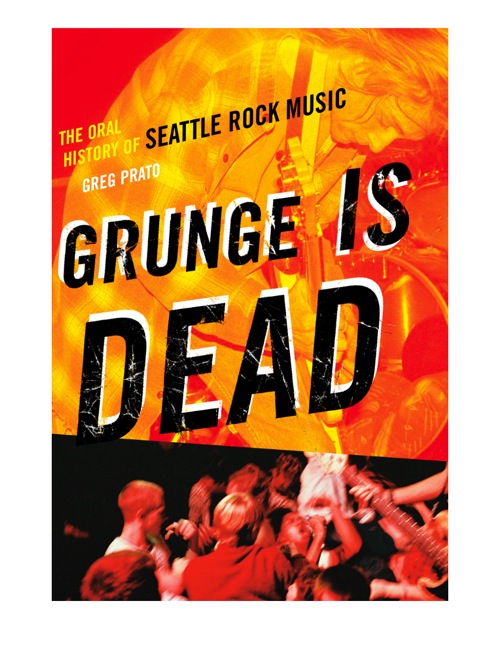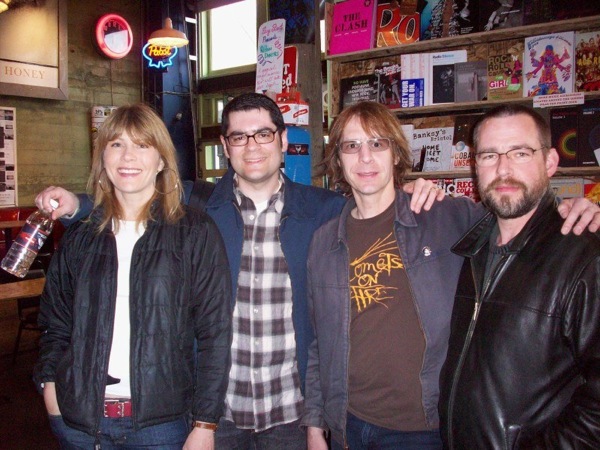
I've been a major fan of grunge bands since 1990, and while I am indeed a big admirer of Nirvana and Pearl Jam, it seems like most articles or books written about the grunge movement really just focus solely on those two bands. So I wanted to do a book that would "share the spotlight" on the bands that usually get left out of all the fun. Also, the germ for the book's idea can be traced back to a Soundgarden feature I did for Classic Rock Magazine a few years ago. For that article, I interviewed a few band members and producers, and Jack Endino (who produced Soundgarden's 'Screaming Life,' Nirvana's 'Bleach,' Mudhoney's 'Superfuzz Bigmuff,' etc.) brought to my attention that most of the articles and books about grunge bands nowadays are being written by people who were not from the area, but that the authors were giving their "revisionist take" on what happened. Although I am indeed not from Seattle (I'm from New York), I came up with the idea of doing a "grunge version" of one of my favorite books of all-time, 'Please Kill Me,' which is an oral history of early punk. Oral histories are solely a collection of quotes from the participants, so you're getting the story straight from the horse's mouth. So, with 'Grunge is Dead,' I think I accomplished putting together a book that is pretty darn unfiltered (and quite extensive - I did nearly 130 interviews for it, and the book is close to 500 pages long).
Some of the people (like the Soundgarden guys) are fairly reclusive. B Was there an interviewee that vetted you so - that others agreed to participate?
Everyone was pretty receptive. The more interviews I did, the more people would suggest others I should touch base with and interview, as well. One gentleman who was an incredible help in that department was none other than Mr. Mark Arm. Setting up the interview with Eddie Vedder took a bit of time and effort, but after I interviewed PJ bassist Jeff Ament, I believe he vouched for me, and Eddie soon came a-callin'.
To what degree did people have conflicting memories?
From what I remember, not many memories conflicted too much. The tricky part of putting together an oral history that is this big is that you have to make sure the same stories aren't repeated over by different people.
Some subjects that people talk about (e.g. Kevin Wood talking about Temple of the Dog or Reagan Hagar talking about the first Brad record getting squashed [I'm blanking on a Mudhoney one at the moment]) haven't been discussed before in other interviews that these people gave. B How did you and the participants get to these subjects?
That's the beauty of conversing between two human beings - as an interviewer, you can ask a question, and if the interviewee feels like answering it, he or she will! Just kidding - I was lucky that so many people opened up for this book and shared insight/stories that I've never come across before. I think many of the people I spoke to could tell I was a long-time fan and knew my stuff - I wasn't someone who was just trying to throw together a quick book that regurgitated the same doo-doo that's been recounted time and time again elsewhere. And as I said earlier, I think some of the people that I had interviewed would vouch for me to others, and give me the proverbial "thumbs up," so to speak.
How did you find Mark and Steve?
I found Mr. Arm through Sub Pop's publicist at the time, Steve Manning. And through Mark, he hooked me up with Mr. Turner. Not to make it seem like this interview is a "Kiss Mark Arm's Ass-Fest," but I have to say, the interviews I did with Mark (believe it was three total) were definitely among the best for the book. He pulled no punches, and told some really great stories - not only about himself and the bands he was in, but also other people/bands from the scene.
After all this work on the project, what's your main impression of Seattle music?
Like any scene, there's good and bad. But as I've said quite a few times in interviews I've done promoting 'Grunge is Dead,' I compare the grunge movement of the early '90s to the punk movement of the '70s and the hippie movement of the '60s. All three of these movements went beyond just music - they all shifted society in their own way (fashion, politics, etc.). I don't think any musical movement has come close to the grunge rockers from Seattle, I must say.
Anything else?
Also, if I can give two plugs. One is for my website (which gives updates re: my writing and what I'm up to), and that is www.myspace.com/gregpratopage. The other is that I just put out a book that is a compilation of most of my interviews/articles for several UK mags over a 5 year span, called 'No Schlock...Just Rock!', which includes a Q&A I did with Mark circa 'Under A Billion Suns,' as well as the Soundgarden feature I mentioned above, and a "Grunge Buyer's Guide." To read some samples from the book and for ordering info, scoot on over to stores.lulu.com/gregprato.

From left to right: Emily Rieman (Arm), Greg Prato, Mark, and Kyle Solger of Solger at Easy Street Records (West Seattle) on 4/25/09